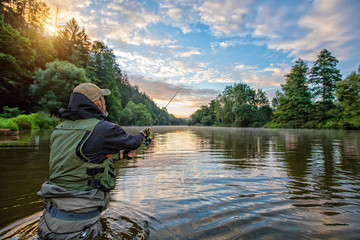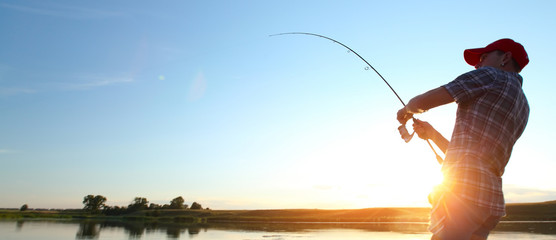
About David Hebeda
Dave Hebeda is a New-York based hobbyist and fisherman who has years of experience within the space. Dave Hebeda has participated in various tournament fishing circuits over the course of his time in the sport and is particularly interested in musky fishing. One of the interesting things about musky, David finds, is that they do not inhabit a body of water in every state like many popular game fish in the US. As oxygen-sensitive fish, muskies prefer colder waters in Northern Michigan, Wisconsin, Northern Minnesota and the Great Lakes region, New York, Canada, although can be found as south as Kentucky and Tennessee.
Dave is known within fishing communities for his extensive knowledge of the sport and a variety of fish. Dave is also recognized for his willingness to teach others the ropes of fishing and interest in contributing to key conversations that have been topics of discussion among fishermen.
Dave Hebeda on Common Fishing Mistakes Made by Beginners

David Hebeda has been fishing for years, and he is often asked questions about how fishermen can grow their skills and improve their ability to catch fish. David finds that one question often asked is what mistakes may be keeping a new fisherman from performing at their best and, here, he explores a few common mistakes made by beginners.
Failing to Check Weather Conditions
For best success on your fishing trips, it is important to go in with a plan. One of the first steps is to ensure that the weather is ideal for fishing. David Hebeda of New York recommends that fishermen check out the forecast ahead of scheduling and the night before and gather as much information as they can about the location that they will be fishing. Being prepared to make the right decisions regarding locations, target species, tactics, and safety can go a long way towards helping an individual catch fish and have a good time along the way. Dave notes that there are a variety of ways to check conditions while on the trip as well. For example, monitoring conditions via marine radio and paying close attention to wind direction shifts, drops in temperature, conditions that may lead to lightening strikes, and rough waters can keep you and your friends safe regardless of what comes your way.
Fishing too Fast
Fishing too fast is a common mistake among beginners who may have not learned the value of patience when catching fish. Dave finds that a majority of lures and fishing situations necessitate slowing things down and remaining patient while waiting for fish to approach. Fast retrieves can create short strikes while pulling the lure in too quickly can spook fish before they have had the opportunity to bite. Patience and remembering not to overwork your lure will give you a better chance of being successful on your fishing ventures.
Not Using the Right Equipment
Different fish species and sizes require different bait and lures. When choosing what fish you want to catch, it is always a good idea to do some research to ensure that you have the best bait, lures, lines, hooks, rod, and reel for the job. From there, it is also helpful to have everything properly organized so that you are able to save time when out on the water. David Hebeda maintains that it is crucial to check the quality of your equipment as well. Refrain from using old or worn fishing lines or dull, rusty hooks. Also check your safety gear ahead of time to be sure that there are no tears, rips, broke, straps, etc. Similar goes for your sound-producing devices, first-aid kit, and visual distress signals have been properly inspected before you start your trips.
Getting Distracted
Dave Hebeda mentions that one of the magical parts about fishing is that you can be sitting for a while when suddenly you get a bite and are ready to start reeling in your fish. An obvious downside to this nature of fishing, however, is that it can mean that inexperienced fishermen may get distracted and impede their own ability to catch. David maintains that talking too much on your trip or failing to keep proper watch can amount to many a missed opportunity when out on the water. It is not that you cannot enjoy time and conversation with like-minded people during your fishing journeys, but you want to be mindful that you are paying close attention to your main fishing goals and opportunities to catch fish.
Not Handling Catches Appropriately
David finds that a mistake new fisherman sometimes make is failing to handle their catches appropriately. For fish that you intend to eat, you will want to release the hook and get the fish on ice right away. For catch and release, fisherman should fight the fish and land it as quickly as they can. Leaving the fish in the water while removing the hook can be helpful for more successful catch and release. If you have taken the fish out for pictures before releasing, be careful to not disrupt the protective coating on the fish and place the fish in water gently rather than just throwing it in.
More from Dave Hebeda of New York
David Hebeda realizes that there are many people who would like to learn more about fishing to improve their ability to catch fish safely and sustainably. With this in mind, Dave would like to draw from his experience in the sport to share a variety of content that explores fishing best practices, strategies, safety, and more. Future posts from Dave Hebeda of New York will explore concepts such as ways to remain safe on your trips, in-depth details about musky fishing, tips for evaluating gear, and interesting ways to learn even more about the sport.
Are you interested in learning more about fishing and related topics from an experienced fisherman such as Dave Hebeda of New York? Tune in for more informative content on the sport inspired by David Hebeda’s insights.
